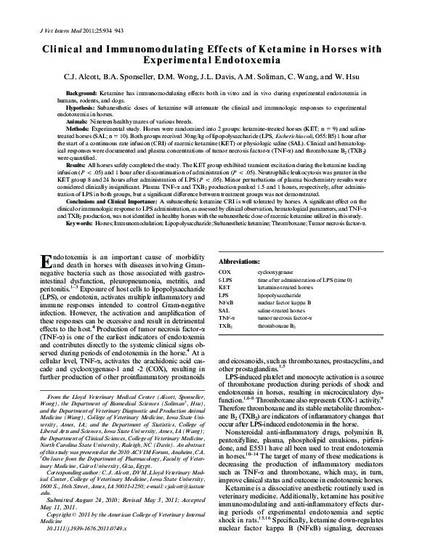
Background: Ketamine has immunomodulating effects both in vitro and in vivo during experimental endotoxemia in humans, rodents, and dogs.
Hypothesis: Subanesthetic doses of ketamine will attenuate the clinical and immunologic responses to experimental endotoxemia in horses.
Animals: Nineteen healthy mares of various breeds.
Methods: Experimental study. Horses were randomized into 2 groups: ketamine-treated horses (KET; n = 9) and saline-treated horses (SAL; n = 10). Both groups received 30 ng/kg of lipopolysaccharide (LPS, Escherichia coli, O55:B5) 1 hour after the start of a continuous rate infusion (CRI) of racemic ketamine (KET) or physiologic saline (SAL). Clinical and hematological responses were documented and plasma concentrations of tumor necrosis factor-α (TNF-α) and thromboxane B2 (TXB2) were quantified.
Results: All horses safely completed the study. The KET group exhibited transient excitation during the ketamine loading infusion (P < .05) and 1 hour after discontinuation of administration (P < .05). Neutrophilic leukocytosis was greater in the KET group 8 and 24 hours after administration of LPS (P < .05). Minor perturbations of plasma biochemistry results were considered clinically insignificant. Plasma TNF-α and TXB2 production peaked 1.5 and 1 hours, respectively, after administration of LPS in both groups, but a significant difference between treatment groups was not demonstrated.
Conclusions and Clinical Importance: A subanesthetic ketamine CRI is well tolerated by horses. A significant effect on the clinical or immunologic response to LPS administration, as assessed by clinical observation, hematological parameters, and TNF-α and TXB2production, was not identified in healthy horses with the subanesthetic dose of racemic ketamine utilized in this study.
Available at: http://works.bepress.com/chong-wang/44/

This article is from Journal of Veterinary Internal Medicine 25 (2011); 934: doi: 10.1111/j.1939-1676.2011.0749.x. Posted with permission.